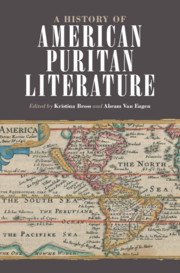Book contents
- A History of American Puritan Literature
- A History of American Puritan Literature
- Copyright page
- Dedication
- Contents
- Figures
- Contributors
- Acknowledgments
- Introduction
- Prologue
- Part I Places
- Part II Approaches
- Chapter 7 Theology
- Chapter 8 Aesthetics
- Chapter 9 Gender
- Chapter 10 Race
- Chapter 11 Print Culture
- Chapter 12 Ritual
- Chapter 13 Manuscript Culture
- Chapter 14 Environment
- Chapter 15 Science
- Chapter 16 Millennialism
- Chapter 17 Postsecularism
- Afterword
- Appendix
- Index
Chapter 7 - Theology
from Part II - Approaches
Published online by Cambridge University Press: 24 September 2020
- A History of American Puritan Literature
- A History of American Puritan Literature
- Copyright page
- Dedication
- Contents
- Figures
- Contributors
- Acknowledgments
- Introduction
- Prologue
- Part I Places
- Part II Approaches
- Chapter 7 Theology
- Chapter 8 Aesthetics
- Chapter 9 Gender
- Chapter 10 Race
- Chapter 11 Print Culture
- Chapter 12 Ritual
- Chapter 13 Manuscript Culture
- Chapter 14 Environment
- Chapter 15 Science
- Chapter 16 Millennialism
- Chapter 17 Postsecularism
- Afterword
- Appendix
- Index
Summary
Puritan theology was distinctly literary. Defined in relation to the Bible and asserting a scriptural standard for faith and religious practice, it was firmly anchored in reading and interpretation. Conversely, puritan theology shaped puritan literature. Puritans considered the Bible as they read it and heard it taught, and they interpreted and wrote about their own experiences in light of the Bible and other textual models of religious experience. Puritan texts were shaped by theology, both because theories of reading and writing were central to puritan faith and because puritan faith was central to the lives and experiences of many puritan writers. Puritan writers – both ministers and laypeople – addressed the complexities of their beliefs and their religious experience in various genres, including theology manuals, sermons, spiritual autobiographies and conversion narratives, and poetry. Puritan writers also addressed theoretical questions about what kinds of textual expression were most appropriate and most spiritually efficacious for their communities. As ministers, political leaders, and laypeople wrestled with the challenges of their faith and its consequences for individuals and communities, they created a varied body of illuminating and moving texts that reveal the rich complexity of puritan belief and puritan literary practice.
Keywords
- Type
- Chapter
- Information
- A History of American Puritan Literature , pp. 145 - 171Publisher: Cambridge University PressPrint publication year: 2020

